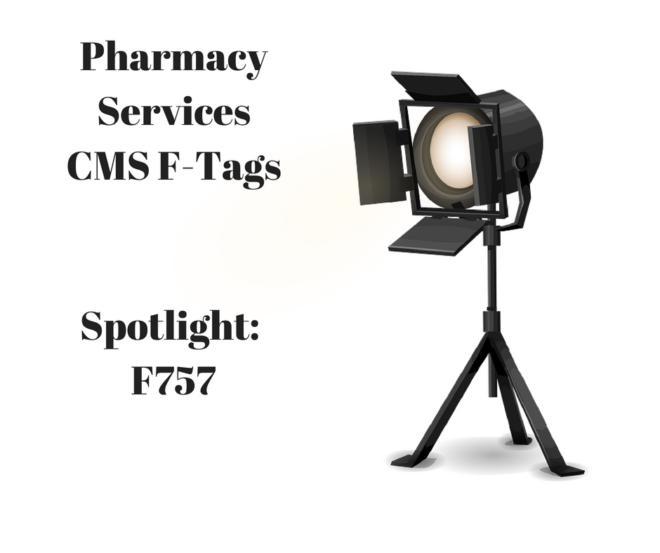Now if you are familiar at all with the old regulations, F329 used to be the catch-all for “unnecessary medications. With the updated pharmacy services F-tags, 757 and 758 have been split up. F757 is essentially the unnecessary medications deficiency for all medications (excluding psych medications – F758). I will discuss F758 in an upcoming post, but will focus strictly on F757 in this article.
As defined by CMS regulations, F757 is the unncessary medication deficiency. The formal language from CMS is found here:
“Unnecessary Drugs—General. Each resident’s drug regimen must be free from unnecessary drugs. An unnecessary drug is any drug when used—”
- “In excessive dose (including duplicate drug therapy); or
- For excessive duration; or
- Without adequate monitoring; or
- Without adequate indications for its use; or
- In the presence of adverse consequences which indicate the dose should be reduced or discontinued; or
- Any combinations of the reasons above”
- For the Full CMS F-tag document and possible insomnia relief, you can click here.
Again, the BIG, BIG change here is that F757 does not include psych medications. From my interpretation you should not get a F757 deficiency for not doing a gradual dose reduction on fluoxetine, quetiapine, etc. F329 used to encompass all of those drugs.
So what can you expect? One classic unnecessary medication I have seen that isn’t psych related is the PPI’s. Drugs like omeprazole that were added to a patient’s regimen and never reassessed or the patient had no response to the drug therapy would be an example of an F757. Keep in mind that you could also get a F756 if your consultant pharmacist did not notify the prescriber/facility of the irregularity.
Drugs without an indication would be another potential culprit. Let’s say we have a patient on cholestyramine for loose stools and the patient is having normal to hard stools. We really don’t have an indication here and we have the potential of adverse effects. At a minimum the drug should be reassessed and rationale documented.
Probably the most common reason I have seen F757 cited here in 2018 is for duplicate (or triplicate) analgesics without good non-drug interventions document and/or parameters in place as to when each pain medication should be used. Expanding on this example; if you have a patient that has an order for Percocet 5/325 every 6 hours as needed, tramadol 50 mg three times per day as needed and acetaminophen 500 mg four times daily as needed, you need a rationale for which medication should be used. If one nurse picks acetaminophen and it works and the next nurse selects the Percocet, you are putting the patient at risk for oxycodone side effects that wouldn’t be necessary as the acetaminophen has proven that it is effective alone. Hence, an F757 could be cited in this situation.
It is a little overwhelming to think about ALL medications, so I will leave you with this. Of the Pharmacy Services tags F-755 through F761, this tag was only cited 8% of the time. If you’d like to learn how often each Pharmacy Services F-Tag is cited, you can follow the blog and get my 30+ minute in depth breakdown on this topic for free.
